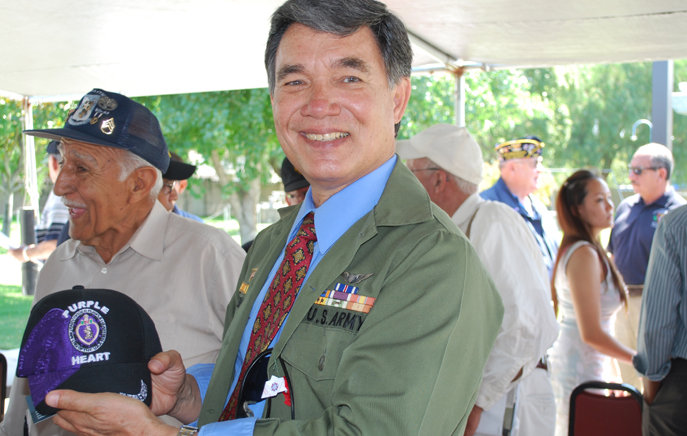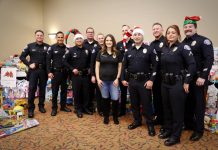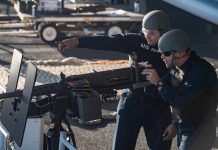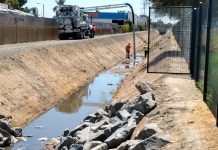By Loreen Berlin
Frans VandenBroek, a Vietnam veteran, was the guest speaker during The Church of Jesus Christ of Latter-day Saints' annual Veterans Day program Saturday, Nov. 9, in Garden Grove.
VandenBroek was awarded the Distinguished Flying Cross and Purple Heart for his unwavering services.
VandenBroek was a helicopter crew chief and door gunner flying 1,200 hours of combat missions with the Army's 68th Assault Helicopter Company during the Vietnam War.
By Loreen Berlin
Frans VandenBroek, a Vietnam veteran, was the guest speaker during The Church of Jesus Christ of Latter-day Saints' annual Veterans Day program Saturday, Nov. 9, in Garden Grove.
VandenBroek was awarded the Distinguished Flying Cross and Purple Heart for his unwavering services.
VandenBroek was a helicopter crew chief and door gunner flying 1,200 hours of combat missions with the Army's 68th Assault Helicopter Company during the Vietnam War.
He lost four helicopters and two pilots; VandenBroek is one of very few enlisted men to wear the DFC.
VandenBroek spoke of the enduring bond between brothers-in-arms, and shared how from an early age as immigrants, his family instilled duty to service in their new country.
“I'm Dutch-Indonesian and was born and raised in Indonesia, which for hundreds of years was a Dutch colony,” VandenBroek said. “We were Dutch speaking, Dutch citizens growing up in Indonesia.”
VandenBroek related that when he was 10-years-old, Indonesia severed relations with anything associated with the Dutch and things quickly turned violent.
“With our lives in danger, all the Dutch and the Dutch-Indonesians fled Indonesia, most of us ending up in Holland,” he said.
Their family wanted to come to America, but with a quota system in place and the U.S. accepting only a limited number of immigrants from each country, they waited two years before they were, “At the head of the line.”
They ended up in Longmont, Co. but eventually made their way to Southern California, ending up in Cypress. He attended Western High School in Anaheim.
VandenBroek said their family of six was grateful to America for adopting them and felt a debt of gratitude to America, so when the war in Vietnam broke out, they knew how they could repay that debt.
“In WWII, dad was a POW of the Japanese for three years; nevertheless, in our family, serving in the military was honorable and perhaps an appropriate means of paying down the family debt,” VandenBroek said.
In 1966, VandenBroek took basic training at Fort Ord and then was sent to Fort Eustis Va. to be trained as a helicopter mechanic.
“Since 90 percent of the Army's inventory of helicopters were in Vietnam, one year into my service I found myself with the 68th Assault Helicopter Company, the Toptigers at Bien Hoa airbase northeast of Saigon,” he said.
VandenBroek said being a mechanic on helicopters is a pretty safe job and that he worked nights, in a hangar, at an airbase with a perimeter of barbed-wire and guards with guns.
"I fixed helicopters and someone else flew them," he said. “That changed four months into my tour when the Army made me a helicopter crew chief at the age of 19.”
He explained that a crew chief is a caretaker and custodian of a single specific helicopter, getting up every morning at 4 a.m. to make their aircraft ready for that day's mission and staying with their aircraft into the night getting ready for the next day's mission. Crew chiefs also fly with their aircraft and double as door gunners.
“My spot was a little canvas stool on the left side of the cabin where I sat, unprotected, with an M-60 machine gun in my hands,” VandenBroek said. “I was responsible for the helicopter's care and maintenance and the lives of the pilots, the crew and any passengers.”
In April of 1968, VandenBroek began delivering troops and supplies, evacuating casualties and prisoners and depositing smoke screens in front of enemy gun emplacements.
“By mid May, I had lost three helicopters and two pilots to enemy-action and a crash and by June, I was transferred to the gun platoon,” he said. “Helicopter gunships don't carry troops or supplies; gunships are heavily-armed attack-helicopters that fly and fight, and by November my year in Vietnam was over.”
VandenBroek said he still had a third year of service left and the Army was going to send him to Germany, but his commanding officer said if he would stay in Vietnam for six more months, the Army would send him home at the end of the six months with an honorable discharge. He agreed.
“Three months into my extension, attacking an enemy position, my gunship crashed into a rice paddy, disintegrated and I was med-evaced out of Vietnam, a 20-year old-casualty of war,” VandenBroek said. “I was feeling satisfied that the family debt had, at least partially, been paid. My younger brother Jacques spent five years in the Navy, and paid the remainder.”
Shortly after VandenBroek's discharge in July 1969, he drove to the Los Angeles courthouse, took an exam, raised his right hand and proudly became an American citizen.
Leaving Vietnam in a hurry, VandenBroek said he hadn't had a chance to say goodbye to his buddies there and lost track of them for the next 35 years.
Eight years ago, through a telephone call and the Internet, he was able to reconnect with some of those with whom he served.
VandenBroek said he attended a reunion a few months ago, for the first time, with 100 of his service buddies in Nashville, Tenn.
“There is no greater bond between men than between men who have been in combat together; that bond transcends rank, age, race, religion, background, social status and even 35 years of separation,” VandenBroek said.
“Do you have any idea how extraordinary you are? There’s not many of you, and your numbers are shrinking. And as vets have lived, shaped and made history, when your country went to war and needed young men and women, you raised your hand and said, ‘I'll go.’
“When your country said, ‘You've done enough; you may go home; your buddies will carry on the fight,’ many said, ‘My place is here – with them.’
“You did these things because you loved them and love your country. Today, at events just like this throughout our United States, your country…. loves you back.”
Garden Grove Stake LDS President Jeff Trader said, “As a religious leader in this community, I call upon the powers of Heaven in blessing our dear veterans who have sacrificed and come home with indelible marks upon their souls.
“I petition our Heavenly Father to grant them peace; to give them leaders who will attend to their physical, emotional and spiritual needs; families who will encourage and be patient; a sacred bond with their fellow soldiers, a knowledge of what they fought for was necessary and worthy of their sacrifice and the eyes to see with clarity, our deep and abiding gratitude for their service.”
VandenBroek holds a degree in mechanical engineering from Cal State Long Beach and has been employed by Applied Medical Resources, a medical device manufacturer in Rancho Santa Margarita for 20 years.
He is currently the Principal Regulatory Affairs Specialist and has six patents for medical devices.
He and wife Karen are the parents of two daughters and reside in Rancho Santa Margarita.
His interests include motorcycle riding/racing, auto restoration, musical theater and writing. He is the author of numerous articles, speeches, monologues and a screenplay.












